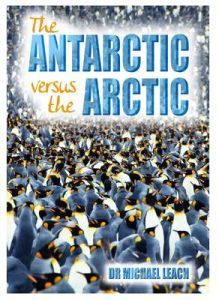Dr Michael Leach
Michael Leach is a full-time wildlife author and photographer.
He has travelled to all 7 Continents and has worked with many of the world’s most charismatic animals - polar bears in the arctic, gorillas in central Africa, lemurs in Madagascar, sperm whales in the mid-Atlantic, monkeys in the Amazon, penguins in the Antarctic and elephants in Kenya. Michael has appeared frequently on both TV and radio.
He holds a Doctorate of Science
Michael also attends schools around the UK, as a visiting author during Book Week, Science Week, Environment Week, etc. He is also a regular speaker at International Schools around the world.
Q&A with Dr Michael Leach
What inspired you to write for reluctant readers?
When I was young books opened up a whole new world for me. I lived in sleepy Shropshire but was reading about tigers and whales, the Amazon Rainforest and the Antarctic. What I read in those books changed my entire future. I went to these places because of the books that introduced them to me. I’d like everyone to have that chance. Books really did change my life.
What challenges do struggling readers face when they open a book?
Many ideas and words in new books are unfamiliar at first and that can be tricky. But the human brain is amazing and if the book is good then you’ll learn without noticing. By the end you’ll know more than you did at the beginning.
What features and methods do you use to ensure that your books have that high-interest appeal that really engages young readers?
I’m really lucky working with big animals because almost everyone likes them before they pick up one of my books. I don’t need to persuade people that polar bears are exciting and interesting, everyone knows that already.
What difference do books like these make to children who are in need of literacy support?
It is much easier to get people to read books on subjects that they find interesting. Most children are fascinated by wild animals, I certainly was. Learning new words and exploring unfamiliar topics is much easier when the subjects are so fascinating.
Can you give us any teasers of what to expect in your WOW! Facts title?
People, even lots of adults, get confused between the Arctic and Antarctic. I’ve been to both many times and they are very different places. A while ago I was asked (by an adult) why polar bears don’t eat penguins. This book will explain why.
What are the major themes of your work?
I want to get people interested in the natural world, to go out and explore these animals and places for themselves. Children need to understand that we need the forests and the oceans for our own survival. If these wild places are destroyed our own survival is threatened. But that’s the serious stuff. I also want to show that wilderness and wildlife is exciting and fun. There are few things more spine-tingling that watching a lion roar at sunset, telling everyone in the African bush that he’s there and in charge. I want people to become involved and go and explore for themselves.
What controls do you place on the vocabulary you use and how important is this?
Some writers use the longest words they know and, unfortunately, that can be to show how clever they are. For me writing is about telling a story or looking at an idea in a way that people can really understand. I remember being told by a teacher “don’t use a long word when a short one can do the same job”. That was good advice and I always try to follow it.
What is your favourite children’s book?
There are too many favourites. Today it’s Doctor Doolittle by Hugh Lofting, tomorrow it might be Wind in the Willows. There are so many brilliant children’s books, they make life a better place.
Do you have any advice for aspiring writers/authors?
Read everything you can. Find out what kind of books you like. There are so many different ways to write, discover which you prefer, which suits you. Experiment, try things and if they go wrong, it doesn’t matter. No-one will shoot you. The more you write, the better you’ll get.




